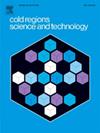基于指数和机器学习模型的青藏高原冻融沉降易感性绘图比较研究
IF 3.8
2区 工程技术
Q1 ENGINEERING, CIVIL
引用次数: 0
摘要
气候变暖导致青藏高原(QTP)冻土区频繁出现融冻沉降,严重威胁生态环境和基础设施。本研究采用指数和机器学习(ML)模型对融冻沉降敏感性进行评估,并比较其准确性。研究选取了沉降指数(Is)、风险分区指数(Ir)和地质灾害指数(Ia)模型来绘制解冻沉降易感性图,并采用多数票标准将它们的结果组合起来构建综合指数(Ic)模型。根据与地形、土壤、植被和气候相关的 12 个条件因子,使用人工神经网络 (ANN)、K-近邻 (KNN)、支持向量机 (SVM) 和随机森林 (RF) 模型进行了易感性研究。结果表明,虽然 Ic 模型提高了 Is、Ir 和 Ia 模型的精确度,但仍有局限性,75.06% 的解冻沉降发生在低度和中度易感地区。相反,ML 模型则表现出更高的准确性,其中 RF 模型表现最佳,仅有 13.87% 的融冻沉降发生在中低易感地区,有效地将羌塘高原和三江源地区定位为高易感地区。值得注意的是,青藏公路(QTH)和青藏铁路(QTR)的布东泉至北路河段被确定为潜在的融雪沉降高风险区。这些发现为青藏高原地区的融冻沉降易感性评估和灾害风险管理提供了宝贵的启示。本文章由计算机程序翻译,如有差异,请以英文原文为准。
Comparative study of thaw settlement susceptibility mapping for the Qinghai-Tibet Plateau based on index and machine learning models
Climate warming has caused frequent thaw settlement in the permafrost region of the Qinghai-Tibet Plateau (QTP), significantly threatening the ecological environment and infrastructure. This study assesses thaw settlement susceptibility using index and machine learning (ML) models and compares their accuracies. The settlement index (Is), risk zonation index (Ir), and geohazard index (Ia) models were selected to map thaw settlement susceptibility, and their results were combined to construct a comprehensive index (Ic) model using a majority vote criterion. Based on 12 conditioning factors related to topography, soil, vegetation, and climate, susceptibility studies using artificial neural network (ANN), K-nearest neighbor (KNN), support vector machine (SVM), and random forest (RF) models were conducted. The results indicate that although the Ic model improves the accuracies of the Is, Ir and Ia models, it remains limited, with 75.06% of thaw settlements occurring in low and moderate susceptibility areas. Conversely, the ML models demonstrated superior accuracy, with the RF model performing the best, which remained only 13.87% of thaw settlements in low to moderate susceptibility regions, effectively pinpointing the Qiangtang Plateau (QP) and Three Rivers Source (TRS) region as high susceptibility areas. Notably, the Budongquan-Beiluhe sections of the Qinghai-Tibet Highway (QTH) and Qinghai-Tibet Railway (QTR) were identified as potential high-risk regions for thaw settlement. These findings offer valuable insights for thaw settlement susceptibility evaluation and disaster risk management in the QTP.
求助全文
通过发布文献求助,成功后即可免费获取论文全文。
去求助
来源期刊

Cold Regions Science and Technology
工程技术-地球科学综合
CiteScore
7.40
自引率
12.20%
发文量
209
审稿时长
4.9 months
期刊介绍:
Cold Regions Science and Technology is an international journal dealing with the science and technical problems of cold environments in both the polar regions and more temperate locations. It includes fundamental aspects of cryospheric sciences which have applications for cold regions problems as well as engineering topics which relate to the cryosphere.
Emphasis is given to applied science with broad coverage of the physical and mechanical aspects of ice (including glaciers and sea ice), snow and snow avalanches, ice-water systems, ice-bonded soils and permafrost.
Relevant aspects of Earth science, materials science, offshore and river ice engineering are also of primary interest. These include icing of ships and structures as well as trafficability in cold environments. Technological advances for cold regions in research, development, and engineering practice are relevant to the journal. Theoretical papers must include a detailed discussion of the potential application of the theory to address cold regions problems. The journal serves a wide range of specialists, providing a medium for interdisciplinary communication and a convenient source of reference.
 求助内容:
求助内容: 应助结果提醒方式:
应助结果提醒方式:


